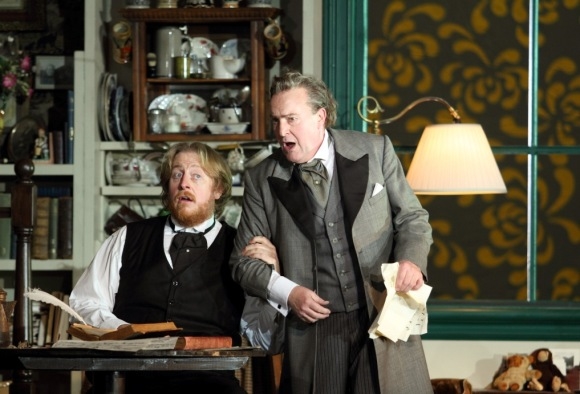Michael Coveney: ENO wins rightful recognition from Oliviers
The English-language opera company is serving up some of the capital’s most interesting work

© Catherine Ashmore
I'm glad that Here Lies Love wins a nod as Best Musical, but there's no sense at all in the exclusion of Dirty Rotten Scoundrels or Made in Dagenham from that category, or indeed Women on the Verge of a Nervous Breakdown, which has all the attributes of a Sondheim show – sophistication, properly insinuating music, deft and witty lyrics – without the vocal brilliance of the superior Broadway original (though it's become critically axiomatic for some inexplicable reason to parrot the Ambassador Theatre Group's promotional line that the commercial failure of the show in New York would be understood after we'd seen the so-called "improvements" made in London).
The critical conversation around musical theatre is more important than ever in the light of the well-documented crisis at the ENO. But the support expressed for the beleaguered artistic director, John Berry, by leading world figures in opera – some of whom work as collaborators with ENO – is significant, not least because the chairman, Martyn Rose, recently flounced out with a hissy fit on Berry's inability, as he saw it, to match up artistic with economic performance: "No right-thinking person would put him anywhere near the front line for delivery."
Opera is expensive, and with the recent closure of two big city opera companies in Baltimore and New York, the argument for merging Covent Garden with ENO has gained a fresh momentum. As Bryan Appleyard pointed out in the Sunday Times, the ENO, which relies on Arts Council funding for 47% of its income, is particularly susceptible to the consequence of the cuts – and that abrupt, dispiriting Labour Party tweet that any government it might form will not cancel those arts budget cuts. The trouble is that, as Berry's artistic programming maintains a high calibre, the figures get worse and there's no sign that the holding transitional funding "gift" of £7.8m has stopped the rot.
I don't want the ENO to merge with Covent Garden – I dislike the snobbish, cultural "we're here because it's Covent Garden and we, the audience, are entitled" mood in the house; at ENO the audience is there because they really want to be. And I don't want them to leave the Coliseum, reduce their brilliant, contracted chorus or cut down on the orchestra. Changing the show each night is especially expensive, but that's what a great international repertory opera house must do (so should the RSC, but that's another story) and the public demand. They have to find a way of making it all work, and so must the Arts Council and the politicians.
'Our theatre is the sounding board of the nation'
Covent Garden this week unveiled a new production of Brecht and Kurt Weill's great financial Sodom and Gomorrah songbook musical The Rise and Fall of the City of Mahagonny, a piece more suited to the ENO (where it was done about 30 years ago), but fitted out with the luxury singers Covent Garden can afford – Willard White and Anne Sofie von Otter – but ENO can happily, and successfully, do without. The last ENO production, Peter Sellars' re-appropriation and elaboration of Purcell's hour-long The Indian Queen, was imaginative and adventurous, incorporating lots of other beautiful Purcell music, and the kind of show you never see at Covent Garden.
Charlotte Higgins of the Guardian wrote a long essay about political theatre last weekend emphasising not so much the political content and argument of theatre at the moment – the sort of debate and performance you don't get in television or many movies these days – but the civic function of theatre, its part in the community, the regions, the very governance of the country itself in native and foreign policy – as in the Ancient Greek theatre. Our theatre is the sounding board of the nation, and nowhere more forcefully, or less obviously, perhaps, than at the ENO.
One thing that seems to have happened is that soaring ticket prices have forced the ageing, middle-aged audience to reduce their visits from three or four a year to possibly two or three, even one or two. And those empty seats aren't conspicuously filling up with a younger audience. That's what must be addressed, not necessarily by more head-banging or hiring of non-theatre directors (Terry Gilliam has been screened from too much scrutiny by his designers) but by connecting with a new up-for-it audience who would love anything directed by Richard Jones or Peter Sellars if only they found their way down St Martin's Lane; critics have their part to play in this, too.
Our theatre, in all its forms and formats, is as "hot" at the moment as at any time I can recall. It's well documented that football, fishing and amateur dramatics are the most popular pastimes in the country. And yet Christopher Hart of the Sunday Times, reviewing How to Hold Your Breath at the Royal Court (admittedly not much cop as either play or production) delivered himself of the astonishing view that "theatre is such a funny little marginal art form these days, noticed by only a tiny, tiny fraction of the population." If there's even a scintilla of truth in this, it's odd that Hart doesn't pause to consider this might be the fault of the people who write about theatre, himself included.












